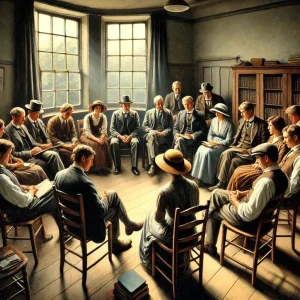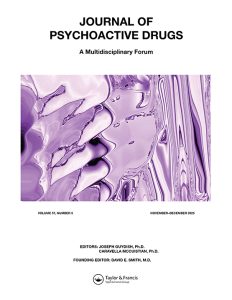 An Oxford Group meeting in the 1930s, which significantly influenced the early development of Alcoholics Anonymous (AA), was quite different from modern AA meetings. The Oxford Group was a Christian fellowship focused on spiritual growth, personal transformation, and evangelism. In Akron, Dr. Bob and many early recoverees continued to attend Oxford Group meetings for their recovery into the early 1940s.
An Oxford Group meeting in the 1930s, which significantly influenced the early development of Alcoholics Anonymous (AA), was quite different from modern AA meetings. The Oxford Group was a Christian fellowship focused on spiritual growth, personal transformation, and evangelism. In Akron, Dr. Bob and many early recoverees continued to attend Oxford Group meetings for their recovery into the early 1940s.
Here’s what an example of an Oxford Group meeting might have looked like, including common Bible readings often read during these gatherings, and a discussion on the frequency of meetings.
Example of an Oxford Group Meeting
- Opening with Prayer and Bible Reading:
- The meeting would typically begin with a prayer, inviting God’s presence and guidance. This prayer set a spiritual tone and emphasized the importance of divine intervention in personal transformation.
- Following the opening prayer, a Bible passage would often be read aloud. Common readings included passages that focused on spiritual growth, confession, and redemption, such as:
- Psalm 51: A prayer of repentance by King David, asking God for mercy and cleansing from sin, which resonated with members’ emphasis on seeking forgiveness and spiritual renewal.
- 1 Corinthians 13: Often referred to as the “Love Chapter,” this passage outlines the qualities of love and was used to emphasize unselfishness and living a life guided by love and service.
- Matthew 5-7 (The Sermon on the Mount): This passage includes the Beatitudes and teachings on living a righteous life, which aligned with the Oxford Group’s emphasis on moral principles like honesty, purity, unselfishness, and love.
- Quiet Time for Meditation and Reflection:
- After the Bible reading, a period of silence known as “quiet time” was observed to allow members to meditate and listen for God’s guidance. This practice was central to the Oxford Group, emphasizing the importance of direct, personal communication with God.
- Members were encouraged to write down any thoughts or guidance they felt they received during this quiet time, which could then be shared with the group.
- Sharing of Personal Stories (Witnessing):
- Members would take turns sharing personal stories or “witnessing,” focusing on their struggles, experiences of spiritual awakening, and changes they had made in their lives. This sharing was often deeply personal and confessional, emphasizing honesty and humility.
- Witnessing involved not just recounting past sins or mistakes but also testifying to how God’s guidance had helped them change and live according to spiritual principles.
- Discussion on Spiritual and Moral Principles:
- After the sharing, a group discussion would often focus on the Four Absolutes—honesty, purity, unselfishness, and love. These were considered the group’s guiding principles.
- The discussion could include reflections on the Bible reading, moral behavior, or personal interpretations of living a spiritually guided life. Passages like James 5:16 (“Confess your faults one to another, and pray one for another, that ye may be healed”) might be discussed to highlight the importance of confession and mutual support.
- Guidance Seeking and Group Reflection:
- The group would collectively seek “guidance” from God on specific issues or decisions facing members. This might involve prayer or discussion on a member’s personal challenges in the light of spiritual teachings.
- Members shared the guidance or insights they believed they received, which were then discussed openly. The practice of listening for God’s voice and acting on it was a crucial aspect of the meeting.
- Moral Inventory and Confession:
- A core practice was conducting a “moral inventory” and openly confessing sins or wrongdoings. Members were encouraged to examine their actions and motives rigorously, identify personal wrongs or moral failings, and confess these to the group or a trusted individual within the group.
- This confession was viewed as a path to spiritual cleansing and renewal. The group often referenced Psalm 139:23-24 (“Search me, O God, and know my heart: try me, and know my thoughts: And see if there be any wicked way in me, and lead me in the way everlasting”) to underscore the importance of self-examination.
- Discussion of Actions to Make Amends:
- Following the confession, there would be a discussion about making amends for past wrongs. Members were encouraged to “make restitution” directly to those they had harmed and to live according to spiritual principles going forward.
- The idea was that making amends was necessary to restore relationships and live a life guided by spiritual principles, often supported by other group members.
- Closing with Prayer and Commitment:
- The meeting would typically end with a closing prayer, asking for strength and guidance to live according to God’s will.
- Members might also commit to specific actions or changes in their lives, often with support and encouragement from other group members. Passages like Philippians 4:13 (“I can do all things through Christ who strengthens me”) were frequently cited to reinforce the commitment to spiritual growth and perseverance.
Frequency of Oxford Group Meetings
- Weekly or Monthly Attendance:
- Unlike modern AA meetings, which can be attended daily, Oxford Group meetings were often held weekly or even monthly. The less frequent meetings reflected the broader, evangelical nature of the group, where members were encouraged to live out their spiritual principles in daily life and return to the group for support, reflection, and renewal.
- This schedule allowed for a more deliberate and contemplative approach to spiritual growth, focusing on the depth of transformation rather than the frequency of meetings.
- Daily Personal Practices:
- While group meetings were held less frequently, members were encouraged to maintain daily spiritual practices such as prayer, meditation, Bible reading, and moral inventory on their own. These daily practices were seen as crucial for personal spiritual development and keeping in constant communication with God.
Key Characteristics of Oxford Group Meetings
- Intimate and Spiritual Atmosphere: Meetings were typically small and intimate, often held in private homes. The atmosphere was deeply spiritual, with a strong emphasis on Christian teachings, prayer, and personal transformation.
- Emphasis on Personal Accountability and Transformation: The meetings fostered personal accountability and spiritual transformation, encouraging members to live by a higher moral code and seek God’s will in all aspects of their lives.
- Inclusive and Evangelical Approach: The Oxford Group was evangelical, actively encouraging members to share their faith and bring others into the fellowship. Members were expected to demonstrate the power of spiritual transformation in their own lives as a testimony to others.
Impact on Early AA
The Oxford Group’s practices of confession, moral inventory, seeking divine guidance, and making amends directly influenced the development of AA’s Twelve Steps. Early AA meetings, especially those led by Dr. Bob Smith and Bill Wilson, mirrored many of these practices, with a strong focus on spirituality, personal accountability, and mutual support.
In summary, an Oxford Group meeting was a highly spiritual and deeply personal gathering centered on prayer, Bible readings, confession, seeking divine guidance, and living a morally upright life. Meetings were typically held weekly or monthly, with an emphasis on daily personal spiritual practices outside the group setting. These practices laid the groundwork for the development of AA, particularly its emphasis on spiritual awakening, personal transformation, and helping others.




